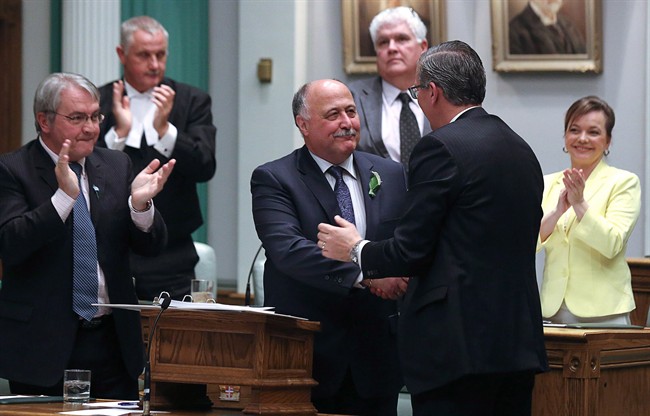Elevate your local knowledge
Sign up for the iNFOnews newsletter today!
Sign up for the iNFOnews newsletter today!
Selecting your primary region ensures you get the stories that matter to you first.

ST. JOHN’S, N.L. – Newfoundland and Labrador’s decade-long oil bonanza ended Thursday with a budget that digs deeper into taxpayers’ pockets while projecting years of deficits, job losses and growing debt.
While critics blamed a reckless blowing of historic wealth, the Progressive Conservative government cited what it called the “unpredictable” collapse of Brent crude prices since June.
That slide combined with lower production drained $830 million in oil royalties from a provincial treasury that relies on those earnings for one-third of its revenues, said Finance Minister Ross Wiseman.
“There’s going to be peaks and valleys in any economic cycle,” he told a news conference.
“What we’re trying to do now is manage our way through that process.”
The $8.1-billion budget Wiseman delivered Thursday for 2015-16 includes a range of tax and fee hikes in response. Most noticeable is an increase in the harmonized sales tax, which jumps by two percentage points to 15 per cent on Jan. 1, 2016.
There are 35 fee increases on everything from drivers’ licences to public swimming. The government is also bringing in new tax rates for the highest income earners who make more than $125,000 a year.
A modest $3-million surplus isn’t forecast until 2019-20, depending on production rates and whether oil prices reach US$90 a barrel.
It’s a long way from the heady days when the province ran up a total of six surpluses worth $5.5 billion through much of the last decade.
Even with the tax and fee measures and a plan to borrow $2 billion to cover spending, Thursday’s budget forecasts a $1.1-billion deficit.
Wiseman said it reflects the province’s risky reliance on volatile oil and mining sectors.
“We’re optimistic that oil will recover, commodity prices will recover,” he said.
Wiseman is also forecasting deficits totalling $1.6 billion for the next three fiscal years, with economic contraction and higher unemployment through 2018.
For now, Wiseman said he chose a balanced approach of borrowing, tax hikes and modest spending increases to avoid shocking the economy. He announced earlier this week a plan to cut 1,420 public service jobs over five years mainly through attrition, and said Thursday the government will hire a consultant as part of a broader review of costs.
For 2015-16, the budget is anchored on an average price of US$62 a barrel. The last budget relied on US$105 but the average was just over US$83.
The province took in $1.6 billion in oil royalties in 2014-15 compared to the $2.4 billion it originally forecast. It’s projecting $1.2 billion in oil royalties this fiscal year.
The Tories have held majority power since 2003 but are expected to call a fall election.
Liberal Opposition Leader Dwight Ball said the government’s legacy is the mismanagement of more wealth than the province has ever seen.
“The budget is much worse than I thought it would be,” he said Thursday. “As a Liberal government, we would roll back that two per cent increase in HST. We see it as a job killer.”
Ball ruled out program cuts to make up that cash but said a detailed economic plan will be in the Liberal election platform.
“Better management and better planning could have avoided much of this.”
Kim Keating, chairwoman of the St. John’s Board of Trade, said members were already raising alarms about the higher sales tax.
“They’re concerned in terms of retail sales,” she said. “It has been our competitive tax regime that’s enabled economic growth, and we’re chipping away at that a little.”
NDP Leader Earle McCurdy said the budget will hurt those who can least afford it.
“We sailed too close to the wind in the good times, and now we’re paying for it.”
Follow @suebailey on Twitter.
This site is protected by reCAPTCHA and the Google Privacy Policy and Terms of Service apply.
Want to share your thoughts, add context, or connect with others in your community?
You must be logged in to post a comment.